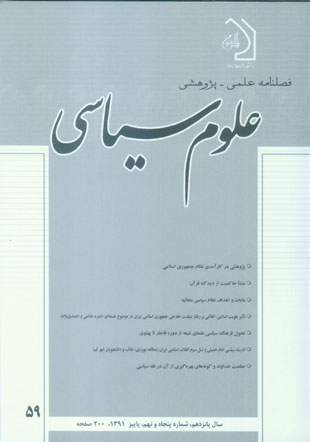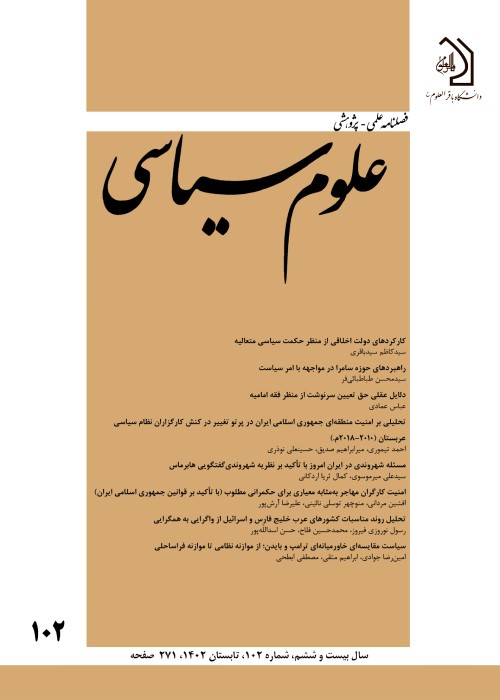فهرست مطالب

نشریه علوم سیاسی
سال پانزدهم شماره 3 (پیاپی 59، پاییز 1391)
- 200 صفحه، بهای روی جلد: 50,000ريال
- تاریخ انتشار: 1391/08/25
- تعداد عناوین: 8
-
-
صفحه 35
-
صفحه 61
-
اندیشه سیاسی امام خمینی و نسل سوم انقلاب اسلامی ایران / مطالعه موردی: طلاب و دانشجویان شهر قمصفحه 135
-
صفحه 183
-
Page 7One of the major concerns being at the center of attention in the developing countries is the issue of efficiency of political system. The issue of efficiency has been the significant challenge concerning the development and progress of Islamic Republic System in the recent years. This article briefly reviews the concept of efficiency and considers its sensitivity on the basis of the stated goals of Islamic Republic System in constitution. It has also investigated the attitudes of elites so that the supreme managers of system take the required steps concerning the reengineering of the system of promotion or the reconstruction of Islamic Republic System through the alteration or completion of the lost circles on the basis of its outputs.The statistical population of this research is not great and it is included a group of elites of Seminary School and University. However, the findings of research illustrate that among the three domains of culture, economy and politics, the first inefficient one in view of elites would be the domain of economy which has fulfilled the least goals of constitution.According to the findings of opinion survey of elites, the efficiency of the domain of politics is better than that of culture as well as economy domains.Keywords: Efficiency, Efficacy, Constitution, Islamic Republic System
-
Page 35Human being is naturally accustomed to living a social life and he is obliged to accept the government rules to satisfy his needs and to remove the difficulties. But, which regulations and government are deserved to be accepted and acted upon? In view of Holy Qur’an, except Almighty God, nobody is deserved to govern. Hence, from all kinds of theism in the knowledge of theology would be the theism in guardianship, theism in religion and theism in divinity being crucial for Muslims. Of course, God’s guardianship, against Emirs, is fulfilled by his agents (prophets, successors as well as religious authorities). In this writing, the criteria of rightfulness and legitimacy of government and its origin in view of glorious Qur’an would be studied on the basis of documentary, analytic and descriptive method. It seems that the essential and attributional state of Godparticularly God’s creativity and ownership would be the origin of his guardianship as well as the reason of his agents ruling on people. Thus, the legitimacy of the divine government is on the basis of the rightfulness of God and the legitimacy of thegovernment of his agents depends on his authorization, and the people’s idea could provide the ground.Keywords: Quran, Government, Caliphate, Caliph, Guardianship, Guardian, Legitimacy
-
Page 61Faculty Member of the research center of Islamic thought and culture The present article is to clarify the supreme political system on the basis of the framework of the four reasons. Hence, it has been stated an introduction besides the concepts such as the four reasons as well as the supreme political system. Subsequently, the issue has been concluded through two major parts and six sub-parts. The first major part has to do with the mundane objectives including three belief -based, ethical and jurisprudential objectives.The second major part concerning the other world objectives has been discussed through three sections. It has been investigated the lesser warfare in the first part, the middle warfare in the second part and the greater warfare in the third one.Keywords: Four Reasons, Supreme Political System, Objectives, Lesser Warfare, Greater Warfare
-
Page 75The Islamic-Revolutionary identity of Islamic Republic of Iran has been the cause of the maintenance of foreign policy behavior of Iran in many areas from the beginning of the development of revolution in 1357 up to now. This continuance of behavior could be observed in the nuclear issue of Iran. Yet, what is the reason of behavioral difference on behalf of Islamic Republic of Iran in the two periods of the presidency of Khatami and Ahmadinezhad?This behavioral difference would be apparently observable; however, they have the same aspects as well. Actually, considering the time of declaring the nuclear issue, the way of pursuing the claims of Iran by the two presidents has been different, while both of them have emphasized on the absolute right of Iran. Accordingly, the basic question of this article is the kind of the effect of Islamic-Revolutionary identity concerning nuclear issue on the foreign policy behavior of Iran in the periods of Khatami and Ahmadinezhad.According to the findings of research, in the period of Khatami, considering the international pressure and news advertisements, Iran (with the Islamic-Revolutionary identity) took steps towards the attraction of regional and international trust; nevertheless, the geopolitical realities of Iran, decision making structure of Islamic Republic System, the realities of regional and international system, the concealed intentions of western countries,... led to an aggressive approach for the Islamic Republic of Iran in its nuclear case in the latter period of Khatami and the beginning of Ahmadinezhad period.Keywords: Islamic Identity, Revolutionary, Foreign Policy, Nuclear Case, Khatami, Ahmadinezhad
-
Page 103In the vigorous confrontation with modernity (particularly after Qajar), the Shiite authorities have been given a role of double importance in the political occasions of Iran.The issues such as the bases of legitimacy of government, the relationship between government and religion, the role of people, etc….. are the issues responding to them would be considered as something inevitable by the Shiite authorities.The concept of political culture would be of great capacity in the reflection of approaches concerning the most declared elements in field of policy. Through a conceptual framework on the basis of the pattern of” interest and usury” linked to the political culture, the present research has clarified the fundamental elements of political culture of Shiite authorities belonging to this trend in the two periods of constitution and Pahlavi. Moreover, it has been investigated the fundamental change of these factors and their priority in these two periods utilizing the content-based analysis.Keywords: Political Culture, Political Culture of Shiite Authorities, Qajar, Constitution, Pahlavi
-
Political Deliberation of Imam Khomeini and the Third Generation of Islamic Revolution of Iran / (Case Study: Clergymen and the Students of Qom City)Page 135The present research has investigated the acquaintance of the third generation of Islamic Revolution of Iran with the political thought of Imam Khomeini through the survey method. To investigate the issue, it was clarified the properties of political thought of Imam on the basis of his works in terms of cosmology, epistemology, fundamental concepts, political philosophy, political jurisprudence, and political ethics.Accordingly, a questionnaire was designed and the data was collected through the completion of questionnaire by 600- people sample being selected among clergymen and the students of Qom city. Finally, the data was summarized through SPSS software. Based on the findings of research, the amount of familiarity of the clergymen and the students of city with the issues like political philosophy, cosmology, political works, political morals, epistemology, fundamental concepts as well as political jurisprudence in the political thought of Imam was calculated as much as 89/61, 82/89, 81/21, 78/04, 77/86, 75/48 and 74/01 with the mean of 79/86 percent.The other finding of research is that the variables such as sex, age, and marital status, the place of residence (city/country) and the educational level of respondents except the place of education have been ineffectual in the amount of familiarity of them with the political thought of Imam.Keywords: Political Thought, Imam Khomeini, Third Generation, Islamic Revolution
-
Page 167Theological issues would be of great importance being utilized particularly in favor of the deduction of jurisprudential issues. One of the most important theological matters would be God’s wisdom being along with the extensive discussions among theologians particularly Adlieh and Ash’arites.In this article, following the discussion regarding the idiomatic meaning of wisdom in view of Twelvers, Mu’tazilites and Ash’arites, it would be considered the purposefulness of God’s deeds and its purification from ugliness in addition to the pursuits of jurisprudents in the deduction of the issues concerning political jurisprudence out of this theological issue.In this writing, it has been endeavored to explain a large amount of uses in the discretion such as making use of issuing or not issuing the narration from infallible, the comprehension of essential decree, the use of absoluteness or no absoluteness, issuing the narration from the state of propagation or issuing the state of guardianship, proving the persistence of decree or the absence of its persistence, as well as the state of violation and disturbance.Keywords: Relationships of Sciences, Knowledge of Theology, Knowledge of Jurisprudence, God's Wisdom, Political Jurisprudence


